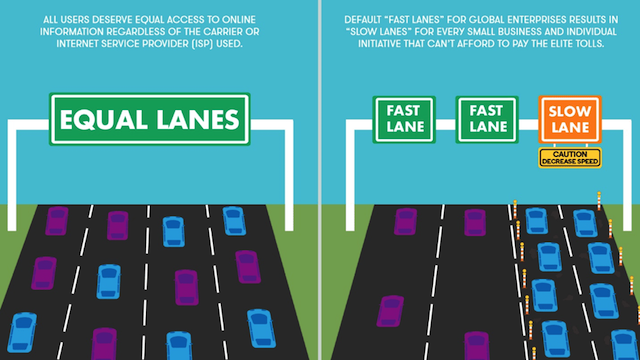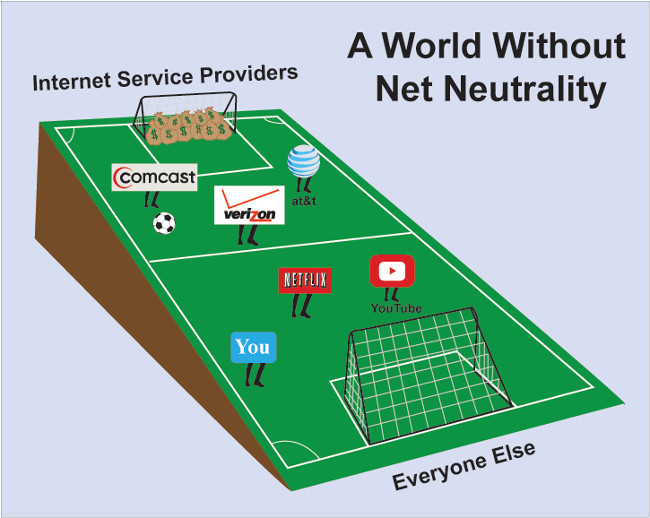December 15, 2017 | Online
FCC ends net neutrality and gay people should be concerned

Sorry, boys, but the Federal Communications Commission (FCC) has voted to dismantle regulations that have allowed the Internet in the US to remain relatively free and open.
The five-member panel -- three Republicans and two Democrats -- voted three to two to roll back rules established in 2015 under Barack Obama aimed at ensuring Internet Service Providers (ISPs) have to treat all data equally along their networks; this is known as "net neutrality."
Without these regulations in place, ISPs like Verizon and Comcast can dictate which sites will load more slowly through your connection (like Netflix) and which sites to block altogether (like Next Door Studios or BananaGuide!!!).
"I have heard from innovators, worried that we are standing up a 'mother-may-I' regime, where the broadband provider becomes arbiter of acceptable online business models," Democratic FCC Commissioner Mignon Clyburn said in her dissent. "When the current 2015 net neutrality rules are laid to waste, we may be left with no single authority with the power to protect consumers."
Back in 2014, researcher Mary L. Gray, Ph.D., explained why net neutrality was especially important for the queer community.
"... LGBT-identifying people will be collateral damage if Internet Service Providers are allowed to discriminate among content, apps or services," she wrote. "Without Net Neutrality protections, content providers generating critical information would likely have to pay more to get their content into (and from!) the hands of LGBT people. That means ISPs become the defacto gatekeepers controlling what content survives and what content falls by the wayside in the wake of a market-driven content tsunami.
"This, in turn, will raise the cost of providing LGBT content, reducing the overall amount of LGBT content available. This will be a significant barrier to the non-profit sources of content that have proven critical to LGBT communities, including information provided by the U.S. Government."

GLAAD's Sarah Kate Ellis put it this way: "Without net neutrality, censorship and erasure of the LGBTQ community is not only possible, but inevitable."
Of course, now that the FCC has made its decision, that doesn't mean the end of the Internet as you know. Many groups have promised to challenge the decision in court, and Congress can still scuttle any changes as it now has 60 days to review the FCC's move.
As well, many of the ISPs have claimed there is no reason for them to act any differently without these regulations. (Of course, if that were the case they wouldn't have pushed so hard to end net neutrality in the first place.)
This fight is far from over.
Gay Porn Reviews
Collegiate
86 Broke Str8 Boys [visit]91 Corbin Fisher [visit]
93 Bel Ami Online [visit]
88 Blake Mason [visit]
88 Cocky Boys [visit]
▻ All Collegiate Reviews
Hunks
84 The Bro Network [visit]79 Men.com [visit]
81 Active Duty [visit]
87 Chaos Men [visit]
85 Next Door Studios [visit]
85 Falcon / HH [visit]
82 Pride Studios [visit]
88 Lucas Ent. [visit]
80 Fucker Mate [visit]
▻ All Hunks Reviews
Masculine
84 Raging Stallion [visit]87 Tim Tales [visit]
82 Pride Studios [visit]
79 Butch Dixon [visit]
78 Titan Men [visit]
88 Lucas Ent. [visit]
▻ All Masculine Reviews
Twinks
88 Freshmen [visit]83 Boyfun [visit]
82 Carnal Plus [visit]
79 Fun Size Boys [visit]
▻ All Twinks Reviews
Euro
88 Freshmen [visit]93 Bel Ami Online [visit]
83 Kristen Bjorn [visit]
▻ All Euro Reviews
Fetish
86 Fisting Inferno [visit]83 Serious Bondage [visit]
82 Kink Men [visit]
88 Lucas Ent. [visit]
▻ All Fetish Reviews
Networks
79 Men.com [visit]85 Next Door Studios [visit]
82 Pride Studios [visit]
▻ All Networks Reviews
Top | Home | About Us | Contact Us | Reviews | Galleries | News | What's Up?
BananaGuide: the gay man's guide to porn
© 2000, 2024 Untangled Web Inc.
